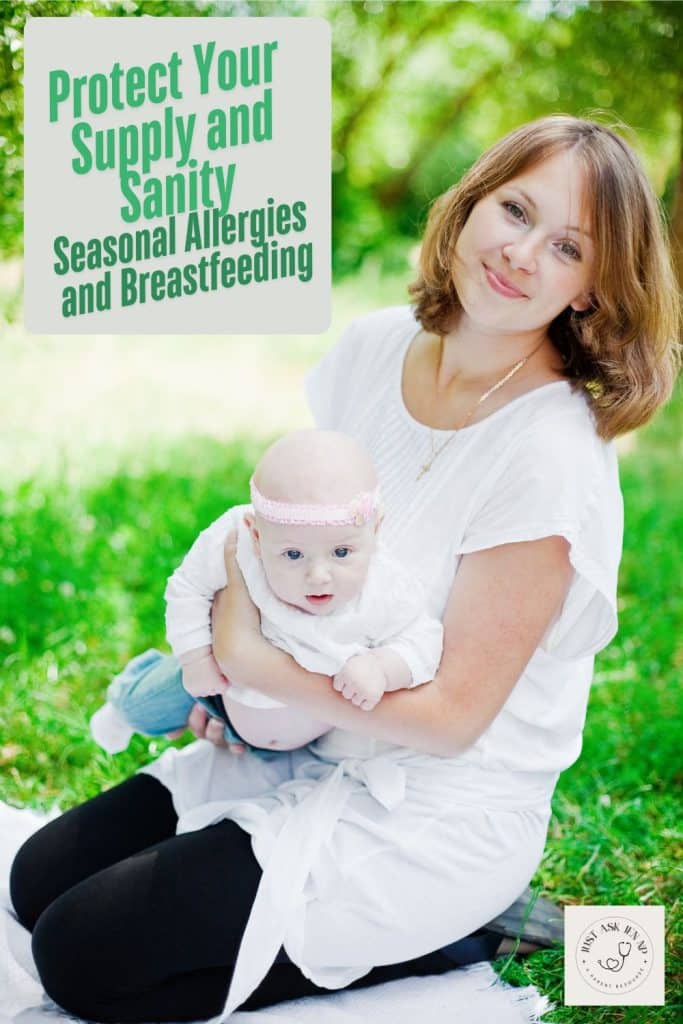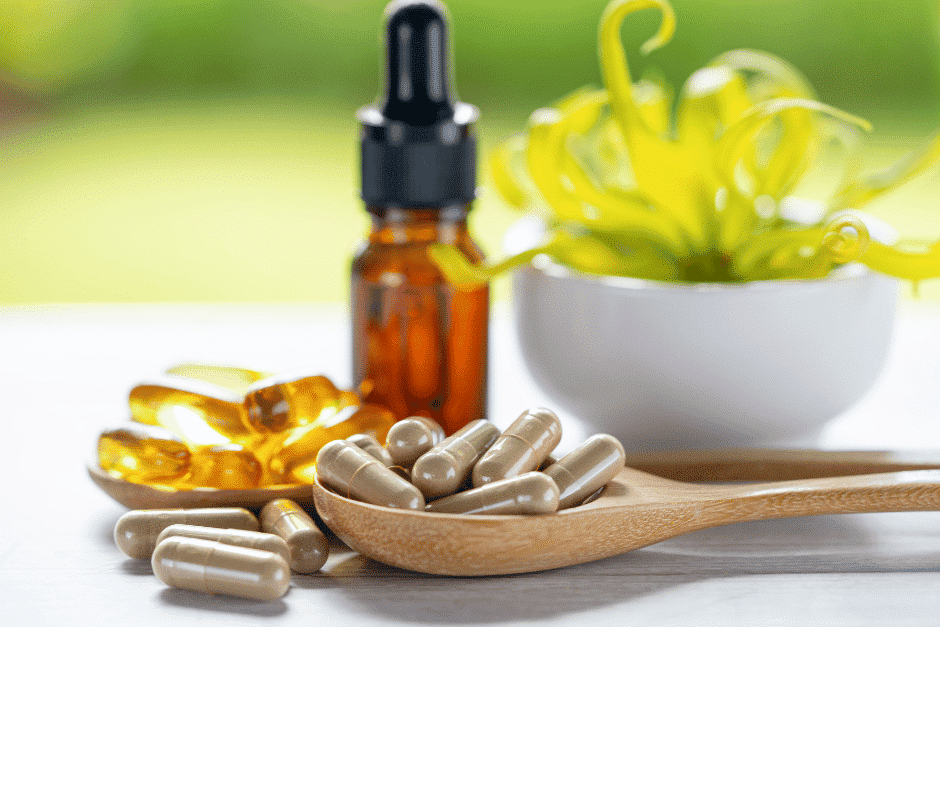Managing Seasonal Allergies While Breastfeeding: Protecting Your Milk Supply and Sanity
Spring brings blooming flowers, warmer temperatures, and for many nursing mothers, the unwelcome return of seasonal allergies. When you’re already navigating the challenges of breastfeeding and motherhood, adding itchy eyes, congestion, and sneezing to the mix can feel overwhelming.
The good news is that you don’t have to suffer through allergy season or worry about compromising your breastfeeding journey.
This comprehensive guide explores safe allergy management strategies specifically for breastfeeding mothers. We’ll cover medication options, natural remedies, ways to protect your milk supply, and essential self-care practices to help you maintain your wellbeing during allergy season.

Understanding Seasonal Allergies While Breastfeeding
How Allergies Affect Breastfeeding
Seasonal allergies occur when your immune system overreacts to pollen, mold, or other airborne substances. While allergies themselves don’t directly impact your milk supply, they can indirectly affect breastfeeding in several ways:
- Discomfort during nursing sessions can make breastfeeding less enjoyable
- Congestion and sinus pressure might make positioning uncomfortable
- Fatigue from allergy symptoms can reduce energy for breastfeeding
- Some allergy medications may affect milk production
Can My Baby Get Allergies Through Breast Milk?
Many mothers worry that their allergy symptoms or medications might affect their baby through breast milk. Research shows that:
- Seasonal allergies themselves cannot be passed through breast milk
- Most allergy medications appear in breast milk in minimal amounts
- Breastfeeding actually provides immune benefits that may help reduce your baby’s risk of developing allergies later
Safe Medication Options for Breastfeeding Mothers
Antihistamines
Some antihistamines are considered compatible with breastfeeding, though it’s important to understand their potential effects:
- Preferred options: Second-generation antihistamines like loratadine (Claritin) and cetirizine (Zyrtec) are generally considered safe during breastfeeding and are less likely to cause drowsiness or affect milk supply
- Use with caution: First-generation antihistamines like diphenhydramine (Benadryl) can cause drowsiness in both mother and baby and may reduce milk production in some women
Nasal Sprays
Nasal sprays often have minimal systemic absorption, making them good options for nursing mothers:
- Saline nasal sprays are completely safe and can provide relief by moistening nasal passages
- Steroid nasal sprays like fluticasone (Flonase) or mometasone (Nasonex) have minimal absorption into the bloodstream
- Cromolyn sodium nasal spray (NasalCrom) works by preventing the release of allergy-causing substances and has a strong safety profile
Decongestants
Decongestants should be used with caution while breastfeeding:
Pseudoephedrine(Sudafed) can significantly decrease milk production in some women- Phenylephrine has less research regarding breastfeeding but may be preferable if a decongestant is necessary
- Consider using only for severe congestion and for the shortest time possible
Important Medication Guidelines
- Always consult with your healthcare provider before taking any medication
- Choose the lowest effective dose for the shortest duration needed
- Monitor your baby for any changes in feeding patterns or behavior
- Track your milk supply when starting new medications

Natural Approaches to Allergy Relief
Environmental Modifications
Making changes to reduce allergen exposure can decrease your need for medications:
- HEPA air purifiers in your bedroom and nursing areas can significantly reduce airborne allergens
- Remove shoes at the door to avoid tracking pollen inside
- Change clothes after being outdoors during high pollen times
- Shower before bed to wash away pollen from hair and skin
- Keep windows closed during peak pollen periods (typically early morning)
- Wash bedding weekly in hot water to reduce allergen buildup
Supportive Nutritional Approaches
While no food can cure allergies, certain nutritional strategies may help manage symptoms:
- Stay well-hydrated to keep mucus membranes moist and support milk production
- Vitamin C-rich foods like citrus fruits, berries, and bell peppers may help reduce histamine levels
- Local honey is often suggested for allergies, though scientific evidence is limited
- Anti-inflammatory foods like fatty fish, turmeric, ginger, and leafy greens may help reduce allergy-related inflammation
Nasal Irrigation
Saline nasal irrigation (using devices like neti pots or nasal rinses) effectively flushes allergens from nasal passages:
- Use only distilled or previously boiled water
- Follow package directions carefully
- Consider using before nursing sessions to improve comfort

Protecting Your Milk Supply During Allergy Season
Hydration Strategies
Staying well-hydrated is crucial for maintaining milk supply, especially when dealing with allergies:
- Aim for at least 12-16 cups (96-128 ounces) of fluid daily
- Keep water bottles stationed at all nursing locations
- Consider tracking intake with an app or marked water bottle
- Include hydrating foods like fruits, vegetables, and broth-based soups
Monitoring Supply Signals
Pay attention to these indicators of a healthy milk supply:
- Regular wet and dirty diapers from your baby
- Steady weight gain according to your pediatrician’s expectations
- Signs of milk letdown during nursing sessions
- Full feeling before feedings and softer breasts afterward
Boosting Supply During Allergy Season
If you notice a decrease in milk production:
- Increase nursing frequency or pumping sessions
- Try skin-to-skin contact to stimulate hormones that support milk production
- Consider power pumping (pumping in short bursts over an hour) once daily
- Discuss galactagogues (supply-boosting foods or herbs) with a lactation consultant
- Ensure you’re getting adequate rest and calories

Self-Care for the Allergic Nursing Mother
Prioritizing Rest
Allergies can be draining, and combined with the demands of nursing and motherhood, adequate rest becomes essential:
- Sleep when your baby sleeps when possible
- Accept help with household tasks and baby care
- Create a restful sleep environment with air purifiers and allergen-proof bedding
- Use elevated pillows to reduce nighttime congestion
Stress Management
Stress can worsen both allergy symptoms and breastfeeding challenges:
- Practice brief meditation sessions during nursing
- Try gentle yoga that’s compatible with breastfeeding
- Use breathing exercises during allergy flare-ups
- Connect with other nursing mothers for emotional support

Creating Comfortable Nursing Stations
Set up allergy-friendly nursing stations throughout your home:
- Keep tissues and sanitizer within reach
- Have water and simple snacks accessible
- Use washable covers on nursing pillows
- Position air purifiers near frequent nursing locations
- Postpartum Recovery Checklist
When to Seek Professional Help With Seasonal Allergies While Breastfeeding
Consult Your Healthcare Provider If:
- Your allergy symptoms significantly interfere with daily functioning
- You notice a substantial decrease in milk supply
- Your baby shows any unusual symptoms or behavior changes
- Over-the-counter options aren’t providing relief
- You experience wheezing, shortness of breath, or severe symptoms
Healthcare Professionals Who Can Help:
- Primary care physician or OB-GYN for medication recommendations
- Lactation consultant for milk supply concerns
- Allergist for severe or complex allergy cases
- Mental health professional if allergies are contributing to postpartum anxiety or depression
Planning Ahead: Creating Your Allergy Season Strategy
Develop a personalized plan before allergy season hits:
- Consult with providers about medication options before symptoms start
- Stock up on safe medications and natural remedies
- Deep clean your home before pollen season begins
- Arrange for extra support during peak allergy periods
- Prepare freezer meals for days when symptoms are severe
- Have a milk supply backup plan if needed
Conclusion
Managing seasonal allergies while breastfeeding presents unique challenges, but with thoughtful planning and the right strategies, you can protect both your milk supply and your wellbeing. Remember that taking care of yourself is an essential part of caring for your baby.
By combining appropriate medications, environmental modifications, and self-care practices, you can navigate allergy season while continuing your breastfeeding journey. Focus on solutions that work for your specific situation, and don’t hesitate to reach out to healthcare providers for personalized guidance.
With each passing spring, you’ll develop more effective strategies for balancing allergies and breastfeeding—adding another achievement to your motherhood journey.
Additional Resources
- Increasing your Supply: https://justaskjennp.com/increasing-breastmilk-supply/
- LactMed (Drugs and Lactation Database): https://www.ncbi.nlm.nih.gov/books/NBK501922/
- Print out of ideas for help: https://milkworks.org/file_download/inline/c79c7562-31f1-4083-bd09-2b5e8e252dd7
